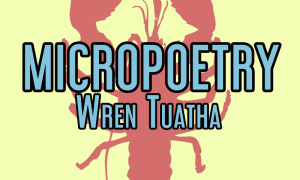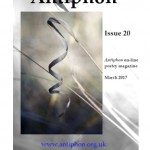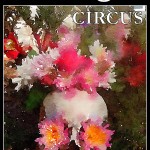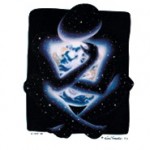National Poetry Month: Two Autumn Skies
 Autumn Sky Poetry Daily is one of several sites that specialize in offering a new poem every day, or nearly so. I like that the editor, Christine Klocek-Lim, follows the poem with an “editor’s note,” a few thoughts on the strengths of the work, what drew her to select that poem out of the pile of submissions. Such comments from an editor are nice for readers and poets. Unlike most publications, Autumn Sky is open to previously published poems. For a poet, this can bring tested work to a larger audience.
Autumn Sky Poetry Daily is one of several sites that specialize in offering a new poem every day, or nearly so. I like that the editor, Christine Klocek-Lim, follows the poem with an “editor’s note,” a few thoughts on the strengths of the work, what drew her to select that poem out of the pile of submissions. Such comments from an editor are nice for readers and poets. Unlike most publications, Autumn Sky is open to previously published poems. For a poet, this can bring tested work to a larger audience.
 My poem, Random John Fox, appeared on Autumn Sky in November. I wrote the first draft when my friend John was hospitalized with deadly meningitis. But in rewrites years later I avoided the narrative story of John, who survived and recently welcomed his second child. Instead, my goal was to reflect on that time of not knowing–when a critically ill or injured person could turn either way. I portraited the randomness of fate as experienced by those in waiting. What do the specifics of a person’s life mean when a virus, car crash or drone strike can kill? Life means everything to the living and those left behind. And like Make Soup, You Said, my poems often try to make sense when life’s large random elements bring death.
My poem, Random John Fox, appeared on Autumn Sky in November. I wrote the first draft when my friend John was hospitalized with deadly meningitis. But in rewrites years later I avoided the narrative story of John, who survived and recently welcomed his second child. Instead, my goal was to reflect on that time of not knowing–when a critically ill or injured person could turn either way. I portraited the randomness of fate as experienced by those in waiting. What do the specifics of a person’s life mean when a virus, car crash or drone strike can kill? Life means everything to the living and those left behind. And like Make Soup, You Said, my poems often try to make sense when life’s large random elements bring death.
I read that death is the most popular poem topic. I’m not sure if it’s true, but the article I read makes the point that if a writer takes on a universally covered topic like death, they need to bring something surprising and new to the discussion or treat the subject in a dramatically creative new way. I must contribute something in writing about loss and death, because editors do pick my grief poems.
 Broom Zen was first published in Winamop, then appeared in Autumn Sky Poetry Daily in March. I believe it may be included in a special upcoming Green Revolution, a memorial edition to Charles Curtiss, my friend who sweeps his way through his own grief in this poem. He himself died last year. I wrote this early in my time at Heathcote Community. Most of my poetry was written in this wonderful natural, communal setting. Broom Zen was an early effort at rhythm and economy. I was also walking a line with narrative and repetition, trying to find my poetic voice while giving my reader enough information for my intended emotional impact.
Broom Zen was first published in Winamop, then appeared in Autumn Sky Poetry Daily in March. I believe it may be included in a special upcoming Green Revolution, a memorial edition to Charles Curtiss, my friend who sweeps his way through his own grief in this poem. He himself died last year. I wrote this early in my time at Heathcote Community. Most of my poetry was written in this wonderful natural, communal setting. Broom Zen was an early effort at rhythm and economy. I was also walking a line with narrative and repetition, trying to find my poetic voice while giving my reader enough information for my intended emotional impact.
People who know John and Charles pick up on details in the poems that make them joyful portraits of these friends. My hope is that readers can access deeper layers of broader meaning and connect with their own experiences of loss. Thank you, Christine and Autumn Sky Daily for accepting my work!
–WT
Join our Hippie Chick Diaries fanpage on facebook!
Subscribe to this blog's RSS feed
National Poetry Month: Five Tuathas in Five:2:One Magazine
 Five:2:One Magazine asked for my batshit crazy submissions. Okay. Early on in my quest to rack up publishing points, I came upon Five2One. Their site has a section for micro poetry, which they apparently define loosely. I was looking for corners where my poems might find a niche. These editors were looking for the wild, reckless, unhinged stuff. My cover letter went like this:
Five:2:One Magazine asked for my batshit crazy submissions. Okay. Early on in my quest to rack up publishing points, I came upon Five2One. Their site has a section for micro poetry, which they apparently define loosely. I was looking for corners where my poems might find a niche. These editors were looking for the wild, reckless, unhinged stuff. My cover letter went like this:
In the spirit of the literary freakshow, I’m flinging the five poems listed below for your consideration. You asked for it; I don’t usually inflict Lobster-Eating Bogeyman on anyone. I didn’t realize micro poetry was a thing or that I was doing it, but here goes! This is a simultaneous submission. I will notify you immediately if any of these poems is accepted elsewhere.
They quickly got back to me, and with a letter that began, “Yo, Wren,” they scooped up all five poems I’d sent. No stuffy dignity here.
When people tell me they don’t understand poetry, I respond that they’re asking the wrong questions. They expect a poem to tell them a story, make them feel fluffy or know the presence of God. Poetry appreciation in schools is very uneven and fades away far too early. I read my poem, Lobster-Eating Bogeyman to such folks and instead of asking what the poem means, I ask them how it makes them feel. There’s no story in LEB, and definitely no fluffy. Universally, people say that it makes them feel disturbed. This is a poem that achieves its goal. I wrote it during/about a mental health episode, a storm of panic and anxiety. My aim was to portrait, even transmit that feeling. The story of what made me feel that way doesn’t matter to my goal, and I don’t remember it anymore. Telling the story would not have had the same visceral effect.
I walk through the world as a queer woman. That’s automatically a fertility issue for me; I always wanted children. Being queer, I had to go to extra lengths to try for parenthood. Added to that impediment, I’ve had uterine fibroids all of my adult life. I walk through the world as a person who wanted children, never had them, and, for most of my life, I taught children. Place me at the barbecue, sitting in circles of parents talking about their children. Endlessly. The difference is Apparent.
I aim to state specifics in my poems. Okay, tree. But what kind of tree? My poems are heavy on concrete images. Yet I want readers to relate, to have a universal human experience. That was a challenge in my poem, Simile, because, honestly, I was writing about my grief at the loss of my pet duck, Lilith. I decided to go with human images in this study of grief. This poem also plays with the concepts of simile and metaphor as ways of describing experiences like grief. Of course, since I was in film school at the time, it wraps with a Hollywood reference.
While Jean Doesn’t Write started out as a playful, private nudge to a friend. First it has science fiction imagery that filled my brain then. But then I turn it to political and personal prods to goad my friend, who was distracted from her writing by a demanding job. Now, years later, who can say which path was best for her. I have my own serious doubts that this poetry thing has any relevance or power to effect change. Anyway, I had to try…
White Paper Poetree is the second poem I tried to write recently, getting back to writing while I struggle with brain fog and other ailments. My process is different, few sweeping inspirations, just hacking fits of stabbing at paper. I guess that’s what got me writing about the paper, and of course, even as I struggle with my own impairments, I get in touch with my privilege. I manage a lot of word play, starting with the title. I use rhythm and line breaks. Think of “flipping ocean waves and seeping petrol” as a parallel to the paper and ink. I comment on the structure of information in our society, how we are shielded from the view of, the knowledge of atrocities like slavery, as we blithely benefit every day. Oh, and, “smacked by atmosphere,” you’re welcome.
I had my break from writing due to illness at a time when I was starting to shift from a lot of navel gazing topics to looking out at the world. I am interested to see if that shift is noticeable as I attempt more new writing.
Thanks for playing along. More coming soon!
–WT
National Poetry Month: Watch Poems, Extinction, etc.
 Issue 82 of Burningword Literary Journal, which includes my poem, The Thud of Escapement, is live on their site and also available for sale in print and digital formats.
Issue 82 of Burningword Literary Journal, which includes my poem, The Thud of Escapement, is live on their site and also available for sale in print and digital formats.
The Thud of Escapement is one of my watch poems. I visited the National Watch and Clock Museum in Columbia, Pennsylvania. I could fill several posts just exploring the interesting collections there. In terms of my poetry, I was inspired by the worlds of gears and precision within the watches and clocks. This became a great image for exploring a conflict I was having at the time. It gave me language, such as the delicious watch word, escapement, to neutralize my hurt of the moment. A common theme in my poetry is to get out of ego and take a larger view, in which one’s personal drama is insignificant to the forces around. I think of this as a repeating micro/macro device in my work. Usually, it compares human upset to the grand scale of nature. This time, it’s the mechanical detachment of watches!
 Antiphon Poetry Magazine in the UK published another of my micro/macro poems, April in Myth. As I usually do, I gave my hot tub date a pseudonym for the poem. I like that I call her April but she’s been around too long to embody any flowery stereotype of spring. Contrast her youthful name to the scale of time in the poem, and the theme of extinction. Again, a momentary upset leads me to ponder insignificance in the grandness of time, and even a view of human extinction. There are hints at climate change mixed in with love found and lost.
Antiphon Poetry Magazine in the UK published another of my micro/macro poems, April in Myth. As I usually do, I gave my hot tub date a pseudonym for the poem. I like that I call her April but she’s been around too long to embody any flowery stereotype of spring. Contrast her youthful name to the scale of time in the poem, and the theme of extinction. Again, a momentary upset leads me to ponder insignificance in the grandness of time, and even a view of human extinction. There are hints at climate change mixed in with love found and lost.
 Addah Belle’s Pocket Watch is proof that I’m not a good judge of my writing. I sat on this one for years because I felt it was too narrative. I don’t like much narration in poetry, just as my own preference. Some writers pull it off brilliantly, and it has its place in history. But I dislike it. Finally I posted it in an online critique group to get pointers on where I should start revisions. Readers loved it as is. (On the other side of the coin, I’m likely to be in love with a poem that readers tear to shreds. Not a good judge of my own writing.) The Bangalore Review was the first publication I sent it to and they got back to me the next day, accepting it for publication. Not a good judge…
Addah Belle’s Pocket Watch is proof that I’m not a good judge of my writing. I sat on this one for years because I felt it was too narrative. I don’t like much narration in poetry, just as my own preference. Some writers pull it off brilliantly, and it has its place in history. But I dislike it. Finally I posted it in an online critique group to get pointers on where I should start revisions. Readers loved it as is. (On the other side of the coin, I’m likely to be in love with a poem that readers tear to shreds. Not a good judge of my own writing.) The Bangalore Review was the first publication I sent it to and they got back to me the next day, accepting it for publication. Not a good judge…
Addah Belle, Auntie to me, was my maternal grandmother’s sister. Long after Auntie had died, Granny gave me Auntie’s old pocket watch. Long after Granny died, Mom and I found Auntie’s letters and the story unfolded. Auntie had been my first writing mentor. Yet I had never known her secrets or why she took such an interest in me. My answer to a topic that is narrative is to pick a different medium other than poetry. Along with the poem, I conceived a play about four generations of the women in my family and the secrets they kept. I wrote it to be staged in an old farmhouse that seems to be a giant pocket watch, gears winding in and out like vines.
More another day!
–WT
National Wren’s Poetry Month: A Few Links
![]() Obviously, several of my poems that have been accepted by journals lately are coming live in time for National Poetry Month. I’ll have another herd thundering through in June.
Obviously, several of my poems that have been accepted by journals lately are coming live in time for National Poetry Month. I’ll have another herd thundering through in June.
I want to put in a plug for PoetryCircle.com. It features a “front page,” an online journal that features some wonderful and often funky poetry and prose. I will have a poem featured on the front page soon. PoetryCircle.com is also a community of experienced poets and writers behind the front page, who post poems and other work on a number of different private boards for critique. I get useful feedback here that helps me prepare my poems to succeed in the world of literary journals. That said, no community is for everyone. If you only want positive feedback or if your poems are what we call inspirational verse, you won’t be happy here. There are other internet groups for these. But if you want to have your work published, come and take in what the editors and members have to say. Participate in the PoetryCircle.com community!
 Driftwood Press includes my poem, The Presence of a Witch, in Volume 4, Issue 2, which is just out! The complete collection of words and art is viewable online. You can also preorder a bound copy, which includes full color art on slick paper. Driftwood likes to go deeper into each contribution. Many of the writers and the artist have been interviewed for the journal, including yours truly! I talk about the genesis of the poem there.
Driftwood Press includes my poem, The Presence of a Witch, in Volume 4, Issue 2, which is just out! The complete collection of words and art is viewable online. You can also preorder a bound copy, which includes full color art on slick paper. Driftwood likes to go deeper into each contribution. Many of the writers and the artist have been interviewed for the journal, including yours truly! I talk about the genesis of the poem there.
The online journal Halfway Down the Stairs features my poem, Old Shelby, in its current Homeward-themed issue. Old Shelby is one of my short poems that has a lot going on–juxtaposition of the old couple with the young couple, snakes, apples and many Garden of Eden images contrasted with the ice storm, a climate change commentary. It implies the march of generations and our mobile society. All the while, it portraits an old craggy rural character I met in the Ozarks.
 In the current issue of Midnight Circus, I have the perfect matching of a poem to a themed journal. This spring themed edition has an introduction that starts, “I don’t like springtime. There, I’ve said it…” These editors were definitely not seeking inspirational verse for their seasonal theme. So the volume leads off with my poem, Thistle and Brilliant, that ends in the line, “Muppets are such liars.” The online version is not live on their site yet, so keep watch. In the meantime, the print version is on Amazon (sorry, abused Amazon workers) and well worth the modest price. Thistle and Brilliant is another example of my allegorical style, in which I write about a thistle and the temptation to touch something that seems soft but isn’t. More broadly, I’m commenting that we humans never learn, always fall in that same old hole. Then I blame muppets.
In the current issue of Midnight Circus, I have the perfect matching of a poem to a themed journal. This spring themed edition has an introduction that starts, “I don’t like springtime. There, I’ve said it…” These editors were definitely not seeking inspirational verse for their seasonal theme. So the volume leads off with my poem, Thistle and Brilliant, that ends in the line, “Muppets are such liars.” The online version is not live on their site yet, so keep watch. In the meantime, the print version is on Amazon (sorry, abused Amazon workers) and well worth the modest price. Thistle and Brilliant is another example of my allegorical style, in which I write about a thistle and the temptation to touch something that seems soft but isn’t. More broadly, I’m commenting that we humans never learn, always fall in that same old hole. Then I blame muppets.
More to come! –WT
National Poetry Month: Make Soup, You Said
Previously published in The Baltimore Review and the poetry anthology Blood and Tears. Upcoming in Avatar Review.
Make Soup, You Said
 I’m making a soup
I’m making a soup
to fill my bowl.
I’m after that carrot of consolation
you dangle.
I would remember
a recipe
uttered
in that season of my childhood
without language.
The three sisters–
corn, beans and squash…
When they hold hands
they can give weight
while they dance and stir,
balanced in a circle chain,
resolved, complete.
 If I know the right herbs,
If I know the right herbs,
if my flame is humble,
if I stir with the tide,
if I ladle with steadiness,
if I eat with grace,
if I digest with stillness,
I will understand
why you have gone.
I wrote you a letter.
I burnt it,
buried it,
scattered it,
sent it sailing,
nailed it to my bed.
Make soup, you said, nothing is simple.
–Wren Tuatha
Join our Hippie Chick Diaries fanpage on facebook!
About Make Soup, You Said: Some experiences just can’t be tied up with a bow. I wrote this poem in my process of trying to make sense of the death of my biological father. He had been gone since I was three. As an adult, I learned that he had died several years before after a life of homelessness. Realizing that I needed to nurture myself and that the situation had many ingredients, soup was the perfect metaphor. I intentionally avoided telling his or my story narratively. Instead I preferred to keep the poem general, like a love song on the radio, so the reader can apply it to their loss, their absent person. Nothing is simple. –WT
Editor’s Note: This post will be closed beginning in June, when Make Soup, You Said will appear in Avatar Review.
